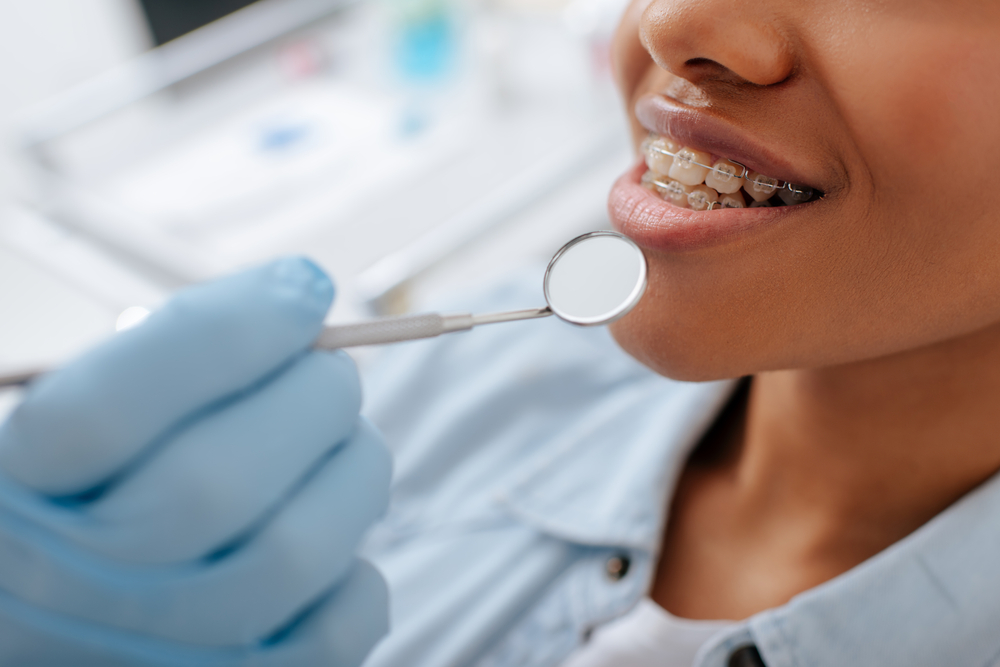In the U.S., “one in four orthodontic patients is an adult,” according to the American Association of Orthodontists. Adult braces in Philadelphia and its suburbs are a more common sight than they once were.
At Penn Dental Family Practice (PDFP), some of the most skilled orthodontists in Philadelphia help people from across Southeastern Pennsylvania get straighter teeth, healthier mouths, and more beautiful smiles.
Keep reading for information about how orthodontics for adults can benefit you, what options are available, and why PDFP is a leading, trusted provider of braces in Philadelphia.
Understanding the Benefits of Orthodontic Care
Before reviewing what options people seeking adult braces in Philadelphia have, consider the many ways orthodontics can benefit you.
Orthodontics corrects bad bites
When your upper and lower teeth don’t come together correctly, you have a malocclusion or “bad bite.” Overbites, underbites, crossbites, and open bites are common malocclusions.
Malocclusions make biting and chewing uncomfortable and painful. Some patients with malocclusions eat less to avoid pain, causing dietary problems. Malocclusions can also make you bite your tongue or cheek more often.
By gradually pulling on your teeth and reshaping the underlying bone, braces bring teeth into proper alignment, eliminating bad bites.
Orthodontics improve teeth spacing
Overcrowded teeth and gapped teeth are also malocclusions. Left uncorrected, they make taking good care of your teeth much harder.
Flossing between overcrowded teeth is difficult. Food particles tend to get trapped in open spaces between teeth. Both problems put you at greater risk of tooth decay and gum disease.
Orthodontic care can correct spacing between teeth. Depending upon your needs, your braces will slowly and safely move your overcrowded teeth farther apart, or close gaps between teeth that belong closer together.
Orthodontics can treat jaw disorders
The temporomandibular joint (TMJ) connects the jawbone to the skull. TMJ disorders cause stiffness and pain in the jaw and discomfort in the face. They can make speaking and eating more difficult and uncomfortable. Sometimes, they cause the jaw to lock.
Orthodontics cannot fix all TMJ disorders. But when a malocclusion has caused the problem, orthodontics can be the solution.
Orthodontics can improve speech impediments and sleep apnea
By correctly aligning teeth and jaws, orthodontics can reduce or eliminate some speech impediments. The tongue will make better contact with the teeth and the roof of the mouth, enabling proper enunciation and speech flow.
Orthodontics can also help treat sleep apnea. Misaligned teeth and jaws can cause the tongue to block a sleeping person’s airway. Orthodontic appliances can keep the tongue in the proper position, leaving the airway unobstructed for easier breathing and better sleep.
Orthodontics can give you a more beautiful smile and better quality of life
Beyond all the health issues orthodontic care can address, don’t underestimate the importance of being more satisfied with your smile.
Having straight teeth and a beautiful smile can make you feel happier and more confident. This attitude can encourage better performance at work or school, more enjoyment of social situations, and a more positive outlook on life.
Reviewing Orthodontic Treatment Options for Adults
Has the thought of filling your mouth with metal kept you from the orthodontist’s office? You should know about the options available to patients today. Each has advantages and disadvantages, but our Philadelphia orthodontists have used them all with success.
- Metal Braces
Metal brackets affixed to the teeth’s front surfaces, connected by wires, and requiring periodic tightening are the traditional choice. Despite the discomfort they sometimes cause, they are a proven and reliable way to move your teeth. They are also usually the least expensive orthodontic option.
- Ceramic Braces
Brackets made of ceramic instead of metal can be clear, tooth-colored, or almost any color a patient wants. While they can be more attractive than metal braces, the brackets can become discolored, and full treatment may take longer.
- Lingual Braces
Metal brackets and wires are placed behind the teeth—on the “lingual” or tongue side—where they work as traditional braces. Lingual braces are practically “invisible,” but they are harder to keep clean and can take longer for orthodontists to adjust.
- Invisible Braces
Instead of using metal brackets or ceramic ones, invisible braces are aligners made of medical-grade plastic. Many patients consider them more comfortable and attractive than traditional braces, and aligners can be removed to make routine brushing and flossing easier. But patients must wear aligners for at least 22 hours a day. Also, aligners work best for only mild or moderate bite issues.
Your orthodontist will determine, based on your circumstances, which option is best for you.
Depending upon the complexity of your orthodontic issue, you can expect to wear your braces anywhere from one to three years. Orthodontic work isn’t inexpensive. But it is an investment in your oral health and self-esteem that can pay off for the rest of your life.
Get Quality Orthodontic Treatment for Adults at PDFP
Adults in Philadelphia who want or need braces trust the orthodontists at Penn Dental Family Practice. We have some of the most highly regarded specialists in the region. Indeed, some of our doctors are respected nationally and around the world.
At both of our convenient Philadelphia offices (University City and Locust Walk), we use advanced technology and the highest quality materials. Our patient-centered techniques put you at ease as much as possible and involve as little discomfort as possible. And we work with all our patients to establish a realistic, achievable payment structure that fits your budget.
Are you in or near Philadelphia and ready to start adult orthodontics? Schedule your appointment online now or call us at 215-898-PDFP (7337).



